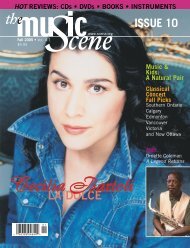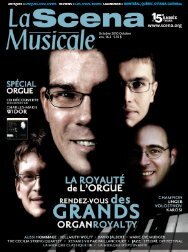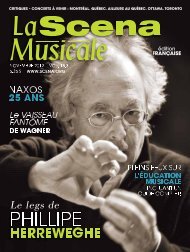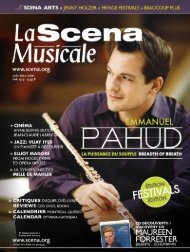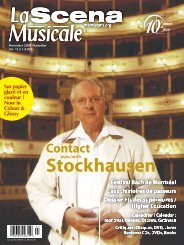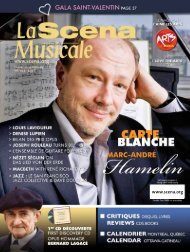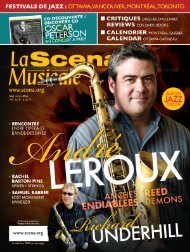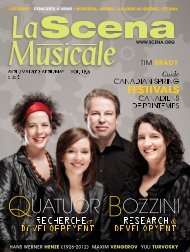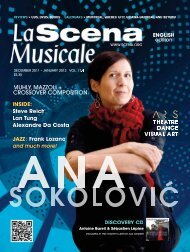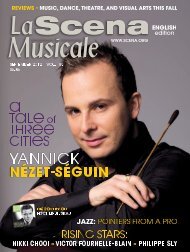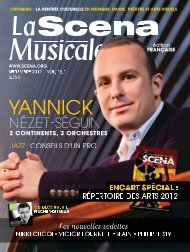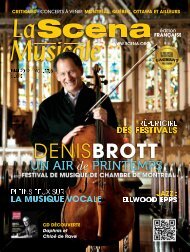You also want an ePaper? Increase the reach of your titles
YUMPU automatically turns print PDFs into web optimized ePapers that Google loves.
MUSICA CAMERATA<br />
FOUR DECADES OF INSPIRATION<br />
PHOTO: ALAIN GRYNBERG<br />
IN THE PHOTO (FROM LEFT TO RIGHT):<br />
Luis Grinhauz and Van Armenian, violins; Mariève Bock, cello; Marie-<br />
Andrée Benny, flute; Berta Rosenohl, piano; Michael Dumouchel, clarinet<br />
and <strong>La</strong>mbert Chen, viola.<br />
Kristine Berey<br />
Music lovers are quiet in anticipation<br />
of the first notes of one of<br />
the most respected and established<br />
chamber ensembles in<br />
Canada’s 40 th season of exceptional<br />
music making. On November 21, in the first<br />
of four concerts planned for this year, Musica<br />
Camerata presents Two Giants, a concert of music<br />
by Beethoven and Dvořák, at Redpath Hall.<br />
“Chronologically we are celebrating 40 years,”<br />
said Luis Grinhauz, violinist and musical director<br />
of the group. “But every season is a celebration.”<br />
There is much to celebrate. The group, varying<br />
from two to eight or more depending on the program,<br />
has received consistent acclaim for the<br />
quality of its performances and recordings.<br />
Recently Jim Lowe of Times-Argus claimed that<br />
the members of the Camerata “are among<br />
Canada’s finest musicians and play in a natural,<br />
expressive and convincing manner. Rosenohl’s<br />
piano is clear, clean and precise, and subtle and<br />
powerful as needed. Grinhauz plays with a rich<br />
warmth, as well as precision, and an interpretive<br />
sophistication.”<br />
From the outset, the ensemble was formed by<br />
high-calibre musicians who had solid careers as<br />
soloists, orchestral players and teachers,<br />
explained Berta Rosenohl, who is, with her husband<br />
Luis Grinhauz, another founding member<br />
of the group: “At the time there was only one<br />
symphony orchestra and the McGill Chamber<br />
orchestra. There was no outlet for professional<br />
musicians to play chamber music [in Montreal]—<br />
an activity we all love and treasure.”<br />
The ensemble began as the initiative of businessman<br />
and “great music lover” Hans Nemenoff,<br />
who regularly held musical evenings at his home<br />
on Circle Road. In 1970, recalled Robert Verebes, a<br />
retired MSO violist, Conservatoire professor and<br />
one of the original Camerata musicians,<br />
Nemenoff suggested<br />
starting a concert<br />
series by local musicians<br />
for a musical<br />
organization on<br />
whose board he<br />
served. He was duly<br />
rebuffed but decided<br />
to go ahead with his<br />
plan anyway:<br />
“Immediately after<br />
that disastrous<br />
meeting, Charles<br />
Reiner and I brought<br />
in <strong>La</strong>rry Combs, a<br />
fabulous clarinet<br />
player. Then I had<br />
the job of recruiting<br />
some string players. First of all, I talked to<br />
Grinhauz and I got to know Berta. In a few weeks<br />
we prepared our first concert.”<br />
That seminal concert took place at a former<br />
Ermitage gym, “acoustically wonderful, otherwise<br />
a dirty hole,” in early March 1971 and featured<br />
Mozart and Brahms Trios as well as music<br />
by Otto Joachim, music that some considered<br />
“way out” at the time.<br />
“The group became a steady chamber music<br />
society,” Verebes said. “We used to play up to 14<br />
concerts a year, to full houses of an absolutely<br />
steady crowd, free of charge.” Musica Camerata<br />
continued to offer free concerts up to its ninth<br />
season. The Canada Council, which had by that<br />
time begun funding them, encouraged the group<br />
to become more proactive regarding financing. A<br />
year later, when Nemenoff died, his widow Imy<br />
took up the administrative duties.<br />
The audience loyalty Musica Camerata has<br />
enjoyed throughout the years is something to<br />
celebrate as well. Boris Brott, conductor of the<br />
venerable McGill Chamber Orchestra, said it is “a<br />
real challenge” to keep a chamber music-based<br />
ensemble going in Montreal. “Chamber music<br />
has in its very nature a contemplative intimacy<br />
that requires a musically-developed audience,”<br />
he said. Longstanding groups like Camerata have<br />
a role to play in building future audiences: “Any<br />
ensemble that stays together that long has within<br />
it a group of people who support it. That creates<br />
further interest in classical music which is<br />
vital, in young people in particular.”<br />
Rosenohl says she is proud of the fact that the<br />
audience returns year after year. Musica Camerata<br />
sometimes receives inquiries regarding pieces<br />
they have played from members of the public who<br />
want to explore them further. “Some read the<br />
scores before they come to the concert,” she said.<br />
“We have a serious, knowledgeable audience.”<br />
The musicians have developed a special rapport.<br />
“Chamber music is such a close collaboration<br />
that it needs lots of dedication and give and<br />
take from all participants,” Verebes said. Luis<br />
Grinhauz expresses the same views:“It’s not easy<br />
to find colleagues who will be our accomplices.<br />
We are all equal in chamber music and sometimes<br />
it’s hard to come to a compromise if you<br />
have strong opinions.” On a personal level, his<br />
high regard for his wife, whom he describes as “a<br />
great pianist,” comes through when he speaks of<br />
the piano’s role in chamber music. “In chamber<br />
music the piano is the vital column, the most<br />
important instrument,<br />
from Mozart to<br />
Beethoven, to<br />
Brahms, Schumann,”<br />
he explained.<br />
The mandate of<br />
Musica Camerata is<br />
an affirmation of the<br />
power of music to<br />
communicate across<br />
time, distance, and<br />
even cultures. “We<br />
prefer to play works<br />
that are unknown or<br />
seldom played,”<br />
Grinhauz said. “Each<br />
year we add because<br />
each year we look for new work.” Two primary<br />
sources of hidden musical treasures for Grinhauz<br />
were the Grove Dictionary of Music and the CBC.<br />
“The CBC had fantastic programming for classical<br />
music. Not any more,” he lamented.<br />
Covering four centuries of chamber music, in<br />
four decades Musica Camerata has played over<br />
300 works and premiered about 100. This season<br />
brings little-known music by 19 th century composers<br />
Vitezlav Novak and Sergei Taneyev, charming<br />
and jazzy Café Music by contemporary composer<br />
Paul Schoenfeld, as well as works by<br />
beloved composers Elgar, Franck and more. As<br />
well, the group has recorded music by Anne<br />
Eggleston, not well known even by professional<br />
musicians, whose 1955 Quartet on just one hearing<br />
reveals itself to be authentic and beautiful<br />
music. The significance of bringing to light and to<br />
life voices that might otherwise have been<br />
shrouded in obscurity or buried in silence is driven<br />
home when one recalls that, for almost a century<br />
after his death, Johann Sebastian Bach was<br />
mostly a forgotten composer. Hendrik van Loon<br />
tells us that the copper plates used for printing<br />
Bach’s The Art of the Fugue were sold for what<br />
they were thought to be worth at the time—the<br />
price of copper, and no more.<br />
“We interpret our beliefs to the best of our abilities,”said<br />
Rosenohl.“The moment music enters our<br />
lives it never leaves us. It allows us to better communicate<br />
and if it helps us transmit our feelings to<br />
others then we succeeded in our mission.” ■<br />
PHOTO : KRISTINE BEREY<br />
Novembre 2009 November 27



